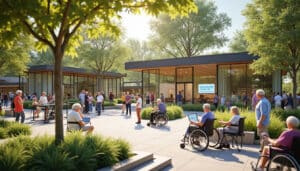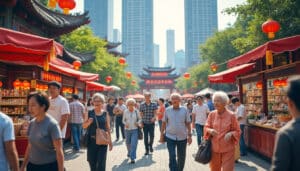Welcome to our online space where your experience is at the heart of our concerns.
We use cookies and data to offer you personalized services and improve the quality of our site.
Your privacy is essential, and we are committed to protecting your information.
We use cookies to track outages, prevent abuse, and measure audience engagement. By accepting all cookies, you help us develop new services and deliver ads tailored to your interests. If you prefer to reject certain cookies, we will respect your choice while still providing relevant content based on your current activity and location. Additionally, you can access additional options to manage your privacy settings according to your preferences.

“`html
In response to the rapid aging of its population, China has adopted a proactive strategy aimed at revitalizing the senior economy. This initiative fits within a context where the number of elderly people is significantly increasing, necessitating adaptations at both social and economic levels.
Why is China investing in the senior economy?
With an aging population, China recognizes the importance of valuing seniors as an economic force. Rather than viewing aging solely as a challenge, the government aims to transform this dynamic into an opportunity. By investing in the senior economy, China seeks to stimulate consumption, encourage innovation, and ensure sustainable growth.
The aging population also presents an expanding market for various sectors such as healthcare, tourism, and financial services. For example, the launch of Shengqing Healthcare in Shenyang perfectly illustrates this trend by providing solutions tailored to the specific needs of seniors.
Furthermore, an extended active population through favorable policies helps maintain economic dynamism and reduce pressure on pension systems. Thus, investing in seniors becomes a win-win strategy, beneficial both for the national economy and for the well-being of older individuals.
What healthcare reforms support the senior economy in China?
The healthcare system is a crucial pillar in the development of the senior economy. China has undertaken several reforms to improve access to care and integrate healthcare services into its economic model. Improving the healthcare system not only ensures a better quality of life for seniors but also stimulates the economy by creating new job and innovation opportunities.
Policymakers have highlighted initiatives to strengthen medical infrastructures and promote telemedicine. Plans to improve the healthcare system also include training programs for healthcare professionals specialized in elderly care.
Moreover, China encourages collaboration between the public and private sectors to develop innovative technologies aimed at facilitating the care of seniors. These reforms are essential for creating a favorable environment for the senior economy, where the specific needs of this population are effectively addressed.
How does innovation play a central role in the senior economy?
Innovation is at the heart of China’s proactive strategy for the senior economy. By integrating advanced technologies and innovative solutions, the country seeks to address the challenges posed by its aging population. Elegant aging demonstrates China’s commitment to adopting modern approaches to enhance the quality of life for seniors.
Innovative projects, such as smart residences equipped with advanced monitoring devices, allow for better health management and increased autonomy for elderly individuals. Furthermore, the use of artificial intelligence to personalize services and recommendations contributes to creating experiences more tailored to individual needs.
This technological integration is not limited to the healthcare sector. Innovation also extends to e-commerce, entertainment, and financial services, thus offering seniors a variety of options to actively participate in the digital economy. By betting on innovation, China ensures that the senior economy remains resilient and continuously evolving.
What exemplary models is China adopting for the senior economy?
China draws inspiration from various international models to structure its approach to the senior economy. A notable example is the reform of the elderly care system, which aims to integrate effective and proven practices from around the world. These models favor better service quality and optimized resource management.
Additionally, initiatives like the launch of coupons to stimulate the senior economy are inspired by successful programs in other countries. These coupons encourage cultural and tourism spending, thus increasing seniors’ participation in various economic sectors.
The model of Shengqing Healthcare in Shenyang is also a key example, demonstrating how private companies can collaborate with the government to provide services tailored to the needs of seniors. These exemplary models help create a robust and adaptable framework for developing the senior economy in China.
What financial incentives does China offer to boost the senior economy?
To encourage the active participation of seniors in the economy, China has implemented several financial incentives. Boosting the senior economy includes programs for subsidies, tax reductions, and financing initiatives specifically designed for this demographic.
A concrete example is the coupons launched by China, aimed at encouraging spending in cultural and tourism sectors. These coupons allow seniors to benefit from significant discounts, thus increasing their purchasing power and economic participation.
Furthermore, tax incentives are offered to companies that develop products and services aimed at seniors. This fosters innovation and creates new economic opportunities tailored to the needs of this population. In parallel, specific financing programs allow seniors to start their own businesses, contributing to a more inclusive and diverse economy.
These financial measures are crucial for ensuring an effective integration of seniors into the economy, providing them with the necessary means to participate actively and meaningfully in the country’s economic life.
How does China manage privacy and data use in the senior economy?
As part of its strategy for the senior economy, China places particular importance on managing personal data and privacy. The use of cookies and data allows for the customization of services offered to seniors, while ensuring the protection of their privacy.
The site uses cookies and data to deliver and maintain services, track outages, guard against spam, fraud, and abuse, as well as measure public engagement and site statistics. These measures help understand how services are used and improve their quality.
Users have the option to manage their privacy settings by choosing to accept all uses of cookies or to reject them for certain functions. By accepting, the data can also be used to develop new services, measure the effectiveness of ads, and display personalized content based on preferences and previous activity.
For those who prefer a simpler experience, non-personalized content is influenced by factors such as the content currently viewed, activity in the active search session, and location. Non-personalized ads are based on visited content and general location. For more information and to manage privacy settings, users can select “More options” or visit g.co/privacytools.
By integrating these privacy policies, China ensures responsible data use, enhancing seniors’ trust in the services offered and promoting active and secure participation in the senior economy.








